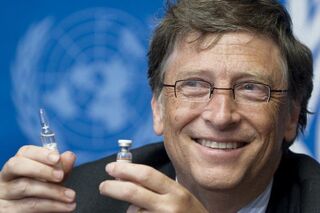Learned Helplessness
Giving Up: Informational Learned Helplessness
It's exhausting when it’s hard to figure out what is true and what is false.
Posted December 23, 2021 Reviewed by Jessica Schrader
Key points
- Learned helplessness can explain why some people become depressed; when we don’t perceive we have an effect on our own lives, we can give up.
- Informational learned helplessness expands this concept to our online lives, explaining why we may become overwhelmed by a quest for truth.
- Better practices by media organizations might make it easier for us to discern truth from fiction and reduce our cognitive exhaustion.

Did Bill Gates fund the creation of COVID-19 in a secret laboratory in the United States as part of an evil plot against Russia and China? Short answer: Nope. Long answer: Still no, of course, but the story about this piece of false information is more convoluted than it appears to be. Let’s take a step back.
The history of misinformation is a long one that predates the printing press, the invention of which offered an enormous increase in the spread of misinformation. As the distribution of information increased in number and reach, so did a multitude of opportunities for false information. As you can imagine, these opportunities increased exponentially with the internet. If it feels like information, misinformation, disinformation, and malinformation (see our last post for the differences among these) are overwhelming, it's because they are.
Informational Learned Helplessness
If you feel helpless in the avalanche of input, there's a name for that. It's called informational learned helplessness and the concept "is based on psychology scholarship that shows that people who experience prolonged exposure to difficult, uncontrollable situations, which they can neither avoid nor alleviate, will ‘learn’ to accept the situation as a given” (Nisbet & Kamenchuk, 2021). This idea is typically discussed in relation to depression, but such helplessness might pervade our online lives, too. Once someone has “learned” to be helpless—whether in their actual or virtual lives—they may give up any attempts to avoid or escape the difficult situation because they feel that their efforts will fail.
Informational learned helplessness likely occurs just about everywhere. But Erik Nisbet and Olga Kamenchuk (2021), writing about false information in Russian media, argue that informational learned helplessness is a particular risk in countries under authoritarian rule where the media are “state controlled, not independent, and often censored.” And that brings us back to the Bill Gates conspiracy that achieved a significant degree of popularity in Russia. The sheer repetition of this lie seems to have led many consumers of Russian media to believe it.
Cognitive Exhaustion
How does informational learned helplessness work its dark magic? The plodding repetition of conspiratorial lies can lead to “cognitive exhaustion.” But it goes deeper than that. Peter Pomerantsev, author of the book This Is Not Propaganda: Adventures in the War Against Reality, popularized the concept of “censorship by noise” in which governments “create confusion through information—and disinformation—overload.” In time, people become overwhelmed, and even cognitively debilitated, by the “onslaught of information, misinformation and conspiracy theories until [it] becomes almost impossible to separate fact from fiction, or trace an idea back to its source.”
And so “censorship by noise,” particularly common in regions governed autocratically, leads people to experience crushing anxiety coupled with a markedly weakened motivation to fact-check anything anymore. They may then “like” or share information without critical review because they lack the energy and motivation to take the extra steps to check it out. Honestly, can you blame them—I mean, us?
Nisbet and Kamen (2021) conducted a study of Russian news consumers and found that those who reported feeling the highest levels of helplessness due to the “emotional costs of discerning truth from fiction” are the most likely to like or share false narratives, like the Bill Gates evil-secret lab conspiracy. But these researchers believe that informational learned helplessness takes a while to develop and that people don’t just give up until they’ve been worn down by the battle to discern the truth. And this can be dangerous. For example, about half of Russians perceived COVID-19 to be no more dangerous than influenza, which may have led to decreased use of protective measures, particularly vaccination.
Of course, this tendency is likely a universal one, and certainly is not specific to Russia. Our media organizations must work to make it easy for us to fact check, for example by including links to their sources, particularly well-documented research. We cannot let ourselves be worn down by the battle to figure out what is true and what is false. In addition, we must train ourselves to look for good links and solid evidence while ignoring unsourced material, lest we exhaust our cognitive reserves. And if we are truly mentally exhausted, we should avoid liking or sharing anything until we can fight back. Sometimes we just need to put away the electronics and pick up a book—or sleep.
References
Nisbet, E. C., & Kamenchuk, O. (2021). Russian News Media, Digital Media, Informational Learned Helplessness, and Belief in COVID-19 Misinformation. International Journal of Public Opinion Research, 33(3), 571-590. https://doi.org/10.1093/ijpor/edab011


